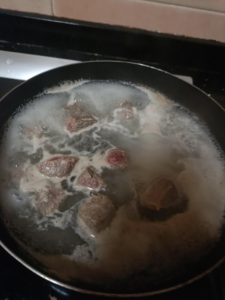
When it comes to preparing healthier meals, many believe that boiling meat is a simple way to reduce its fat content. But is this common belief backed by science, or are there more effective cooking methods for trimming the fat?
The Science Behind Boiling Meat
Boiling meat does cause some fat to melt and float to the surface of the water, especially for fattier cuts like beef or pork. As the meat heats up, fat liquefies and can be partially drained off with the water. However, not all the fat will be lost this way. Much of the fat remains within the meat’s structure, and the amount that escapes largely depends on the type of meat and how long it’s boiled.
Boiling vs. Other Cooking Methods
While boiling can remove a small amount of fat, other cooking methods might be more effective. Grilling, roasting, or broiling allows fat to drip away from the meat more consistently. These methods also typically preserve more of the flavor and texture of the meat, whereas boiling can make it tougher and less appetizing.
Nutritional Impact
It’s important to note that while boiling might reduce some fat, it may also strip away other nutrients and flavor from the meat. Cooking methods like grilling or roasting can strike a better balance between reducing fat and maintaining nutritional value.
Conclusion: Is Boiling the Best Option?
Boiling does reduce some fat, but it’s not the most efficient method. Grilling or roasting may offer better results for those looking to reduce fat while preserving flavor. Ultimately, the best method depends on your health goals and taste preferences.